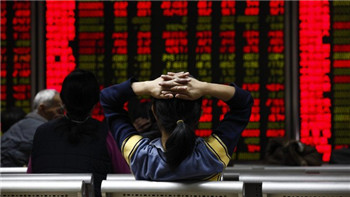
More than $2.3tn was wiped off global stocks this week as China’s slowing economy and currency depreciations spooked investors around the world, leading to the worst start to a year for markets in at least two decades.
由于全球投资者对中国经济增长放缓和人民币贬值感到惊慌,上周全球股市蒸发2.3万亿美元,创下了至少20年来最差的新年开局。
A robust US jobs report, which added a stronger-than-expected 292,000 extra jobs in December, allayed some concerns over US economic growth on Friday but failed to rescue the grim week for financial markets.
美国12月非农就业报告好于预期,增加了29.2万个工作岗位,减轻了对美国经济增长状况的担忧,但未能将整个金融市场从严峻的一周中拯救出来。
The catalyst for this week’s market turmoil has been China’s plunging stock market and weakening currency. Beijing’s powerful influence over financial markets this week underlines for investors how the country’s policy decisions reverberate across the global stage.
上周引发全球市场动荡的诱因是中国股市暴跌以及人民币走弱。北京对金融市场的巨大影响力提醒投资者,中国的政策决定会在世界舞台上产生多大反响。
“This heightened sensitivity of risk assets to Chinese policy is a relatively new phenomenon,” said Mark Haefele, global chief investment officer at UBS Wealth Management. “We can see how even relatively small falls in the Chinese [renminbi] … are having a major impact on global markets.”
瑞银财富管理(UBS Wealth Management)全球首席投资官马克黑费尔(Mark Haefele)说:“风险资产对中国的政策敏感性上升是一个相对较新的现象。我们可以看到人民币即使出现相对较小的下跌……也会对全球市场产生重大影响。”
After initially climbing on the jobs report, the S&P 500 sagged to take its loss for the week to about 6 per cent — its worst start to a year on record — as it briefly suffered a technical correction, according to S&P Dow Jones Indices. The index has lost more than $1tn so far this year.
美国就业报告公布后,标普500指数上周五先升后降。标普道琼斯指数公司(S&P Dow Jones Indices)数据显示,正在经历短暂技术性调整的标普500指数全周跌幅约6%——这是有记录以来最差的开年。该指数一周内蒸发了1万亿美元以上。
Every major European stock market also fell again on Friday.
上周五欧洲所有主要股市也再次下跌。
Chinese stocks managed to stabilise at the end of a turbulent week after authorities scrapped a controversial circuit-breaker and lifted the daily currency fix for the first time in nine days.
随着中国当局取消了有争议的熔断机制,并且9个交易日里第一次上调人民币汇率中间价,中国股市终于在上周五站稳,结束了动荡的一周。
The FTSE All-World index has lost a total of 6.1 per cent this week, making it the worst five-day start to a new year since at least 1994, when the index was established, and the worst week overall since 2011. More than $2.3tn was lopped off the index.
富时环球指数(FTSE All-World Index)上周累计下跌6.1%,从1994年该指数创建以来,创下了开年头5天的最差记录,也是自2011年以来最差的一周。富时环球指数上周共损失2.3万亿美元。
“China is playing a bigger and bigger role in global markets,” said Win Thin, a strategist at Brown Brothers Harriman. “This is the new reality and markets have to accept that.”
布朗兄弟哈里曼(Brown Brothers Harriman)新兴市场货币策略部全球主管Win Thin表示:“中国在全球市场中扮演越来越大的角色。这是一个新现实,市场必须接受这一点。”
Chinese volatility has complicated the outlook for money managers already dealing with tensions between Iran and Saudi Arabia and the start of a US interest rate tightening cycle by the Federal Reserve.
中国的波动性使基金经理面对更复杂的前景,本来伊朗与沙特关系紧张、美联储开启加息周期就已经给他们带来了新风险。
“Investors are fearful of many factors as the negative narrative gains traction generating a sense of malaise,” said Tobias Levkovich, an equity strategist with Citi. “There is some fairly impressive good news but it seems to be overshadowed by headline risks including recent geopolitical ones.”
花旗集团(Citigroup)股票策略师托拜斯莱夫科维奇(Tobias Levkovich)表示:“投资者担心诸多因素,这种负面的消息会吸引注意,产生一种不安感。其实还有一些相当振奋人心的好消息,但媒体大肆报道的包括近期地缘政治事件等风险完全盖过了这些消息。”
Interest rate futures indicate that investors are still discounting the chances of the Federal Reserve lifting interest rates another four times this year as planned, despite the unexpectedly strong unemployment data released on Friday.
从利率期货市场走势可见,投资者仍认为美联储今年按计划再加息四次的可能性不大,尽管上周五发布的就业数据意外强劲。
Some fund managers and analysts argue that the developing world — and China in particular — could be the final stage of a three-part rolling global crisis that began in the US in 2007 and then moved to the eurozone in 2010. Emerging market exchange rates took another dive after the strong US jobless report lifted the dollar, sending the JPMorgan Emerging Market Currency index to a new all-time low.
一些基金经理和分析师认为,2007年始于美国、2010年转移至欧元区的全球经济危机将分三个阶段上演,最后一个阶段将发生在发展中国家,尤其是中国。上周五,在美国强劲的就业报告提升美元汇率之后,新兴市场货币的汇率再次下跌,使摩根大通新兴市场货币指数(JPMorgan Emerging Markets Currency Index)跌至新的历史低点。
Natural resource prices have also fallen into an even deeper funk due to concerns over slowing Chinese demand, with the Bloomberg Commodity index tumbling to a fresh 17-year low. The WTI and Brent crude oil prices have both fallen to about $33 a barrel this week, the lowest since 2004.
由于中国需求放缓的担忧,自然资源价格也进一步下滑,彭博大宗商品指数(Bloomberg Commodity Index)跌至17年以来的低点。美国西德克萨斯中质原油(WTI)和布伦特原油价格上周都跌至约每桶33美元,这是自2004年以来的最低水平。
Mr Thin said Chinese policymakers had “mishandled” its currency management, and pointed out that “in the absence of communication, markets assume the worst”. But he argued that investors were overreacting to the moves and cautioned against extrapolating too much from a handful of trading days.
Win Thin表示,中国政策制定者的汇率管理“失当”,并指出“在缺乏沟通的情况下,市场会抱着最坏的假设”。但他主张,投资者对政策制定者的举措反应过度,并告诫投资者不要过多依赖从少数交易日的行情来进行推断。
“Markets are panicking and lurching from one concern to the next, but we cannot judge the year as a whole by the first week,” he said. “We shouldn’t throw in the towel quite yet.”
“市场正处在恐慌之中,一会儿担心这个,一会儿担心那个,但我们不能靠第一周来判断全年走势,”他说,“现在我们还不到认输的时候。”











